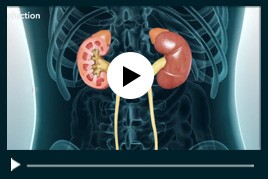Cystic Disease
A cyst is a sac filled with fluid or semisolid material, which may appear anywhere in the body. Cystic disease refers to the development of cysts on the kidney.
Cystic disease may be congenital or acquired. Associated symptoms of congenital cysts include hypertension, chronic renal failure, kidney infection, kidney stones, growth retardation, bone deformities, muscle spasms, bleeding, excessive thirst and urination and failure to thrive. Acquired cysts may arise spontaneously or may be seen in those with end-stage kidney disease receiving dialysis. They may not show any symptoms or may be associated with flank pain or blood in the urine. Cysts may rarely indicate kidney cancer which is associated with symptoms such as unexplained weight loss, high blood pressure, recurrent fevers and ankle swelling.
Congenital cystic disease is usually identified on prenatal ultrasound imaging studies and gene analysis. Your doctor may order an intravenous pyelogram (imaging test that uses an injected dye), CT or MRI scans, or urinalysis to study kidney function and identify the presence of cysts.
Your doctor may choose to monitor simple asymptomatic cysts. Medications may be prescribed for pain. Adequate fluid and salt intake is advised to correct imbalances resulting from impaired kidney function. Your doctor will provide treatment for associated symptoms such as hypertension, urinary tract infection or kidney stones. Minimally invasive surgery may be recommended to improve the flow of blood and urine, or selectively remove areas of affected tissue. Enlarged kidneys that affect breathing or those with poor function or cancer are surgically removed followed by dialysis or kidney transplantation.

 Menu
Menu




